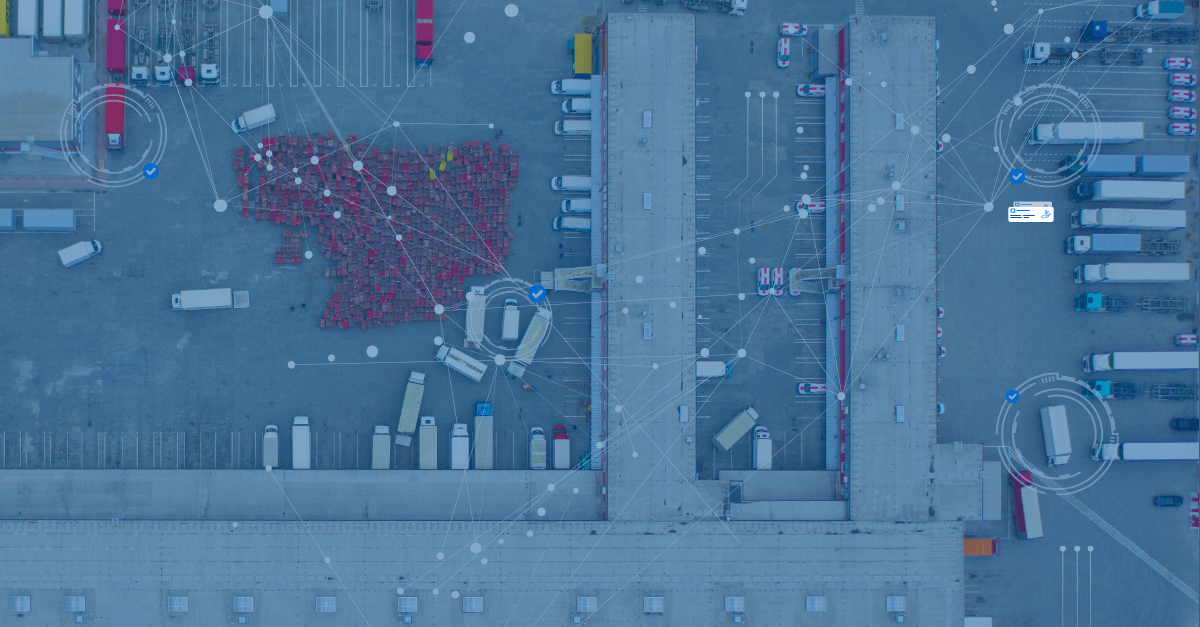Yard management, i.e., coordinating assets like trucks and trailers at a warehouse facility, is responsible for allocating space, handling security, and scheduling trailer loading and unloading, including bay assignments.
 It plays a key role in driving overall efficiency in warehouse operations. Imagine if an inbound driver with a time-critical load didn’t know which bay to pull into. Or if a container needed ASAP for an outbound shipment wasn’t where it was supposed to be.
It plays a key role in driving overall efficiency in warehouse operations. Imagine if an inbound driver with a time-critical load didn’t know which bay to pull into. Or if a container needed ASAP for an outbound shipment wasn’t where it was supposed to be.
Yard management, therefore, has an outsized impact on transportation management, inventory management, and, ultimately, customer satisfaction. Here are some common yard management issues and how artificial intelligence (AI) technology can address them.
The Yard: a Critical Supply Chain Chokepoint
Manual yard management management processes invite inefficiency. For example, manual tracking of asset movements and available inventory equals limited visibility into yard activities. Without real-time information, delays proliferate as staff struggle to locate assets.
Manual data entry can be error-prone, causing incorrect inventory counts, misplaced assets, and inaccurate status updates. This disrupts schedules and delays loading and unloading.
A yard management system (YMS) is designed to coordinate yard operations. But without AI, it’s harder to achieve more efficient resource allocation. This leads to bottlenecks and poor asset underutilization, again causing delays and increasing costs.
Facing a Complex Task, Warehouses Turn to Technology for Yard Optimization
AI is being leveraged to bring greater efficiency to yard operations, including predictive analytics to assess situations and offer solutions.
For instance, algorithms analyze historical data, real-time information, and external factors to identify congestion points and resource requirements. This information empowers yard management leaders to proactively allocate resources where and when needed.
AI also provides real-time visibility into all aspects of yard operations, including the location and status of trailers and containers. This information can be accessed by yard personnel, carriers, and warehouse staff, reducing the risk of errors and delays.
There are clear “green” benefits as well. This is important because many organizations are implementing aggressive sustainability goals and face stricter environmental regulations. For instance, California now requires warehouse operators to track and manage indirect carbon emissions from vehicles entering and leaving their facilities, with stiff penalties for non-compliance.
Efficiency gains from AI-driven yard management means fewer empty trips, less idling time, and better-optimized routes, lowering carbon emissions.
Beyond Yard Operations: Integrating Technology for Holistic Logistics Excellence
With yard management so vital to the supply chain, seamless system integration is needed to achieve greater yard efficiency and logistics operations as a whole.
A YMS is a great tool for tracking assets and aligning them with operational needs. But when augmented with AI and its automation capabilities, orchestration with enterprise systems (WMS, TMS, SCM, OMS, and ERP) is taken to the next level. Real-time data is exchanged on inventory, order status, and demand forecasts. Yard operations become more closely aligned with demand and available capacity, providing key resources as needed.
Integrating an AI-enhanced YMS with TMS, for example, enables more optimized load planning and shipment sequencing by analyzing data on vehicle capacity, delivery schedules, and transportation constraints. Enhanced visibility into transportation schedules, routes, and availability better syncs yard operations with inbound/outbound operations.
Implementing AI in Yard Management: Three Best Practices to Optimize Operations
Now that we’ve examined the power of AI to improve yard management operations and other logistics functions, we’ll look at three practical ways that EAIGLE’s next-generation technology takes optimization to the next level.
Build Contingency Across Telematics
EAIGLE’s Multi-Device Processing (MDP) accommodates diverse data inputs from your existing optical and IR cameras and radar sensors. This helps you develop contingency plans for potential disruptions while ensuring seamless processing of data feeds based on weather conditions and property characteristics.
Establish a protocol for handling data from multiple devices, optimizing the robustness of the AI algorithms. EAIGLE’s MDP software is adaptable to multipoint data sources to make all this happen.
Customized Integration Plans
EAIGLE’s implementation team works closely with you to create a customized integration plan, based on the specific needs and processes of your yard and warehouse operations. Implementation is phased, minimizing disruptions and allowing for real-time adjustments.
With this customized integration plan, EAIGLE’s AI solution aligns seamlessly with existing yard operations and the technology stack, optimizing each process while minimizing disruptions. Regularly communicating with the EAIGLE team throughout the integration process helps immediately address any issues as they arise.
Continuous Monitoring and Optimization
Establish a regular monitoring schedule to track system performance, leveraging powerful built-in tools in the EAIGLE platform. Review real-time analytics to identify ways to provide even greater levels of optimization.
These regular assessments help you drive sustained efficiency gains over time, adapting the system based on your evolving operational needs.
Upping Your Yard Operations Game
Yard management is a critical component of overall supply chain operations that often gets overlooked compared to “sexier” supply chain functions. It involves a complex dance of assets in motion, matching trucks, trailers, and chassis with the flow of warehouse operations, order fulfillment, and inbound/outbound logistics.
Augmenting yard operations with artificial intelligence, including existing YMS software, opens up new ways to optimize and enhance your existing yard operations, driving efficiency, cost savings, and improving sustainability. Request a demo with EAGLE today.


